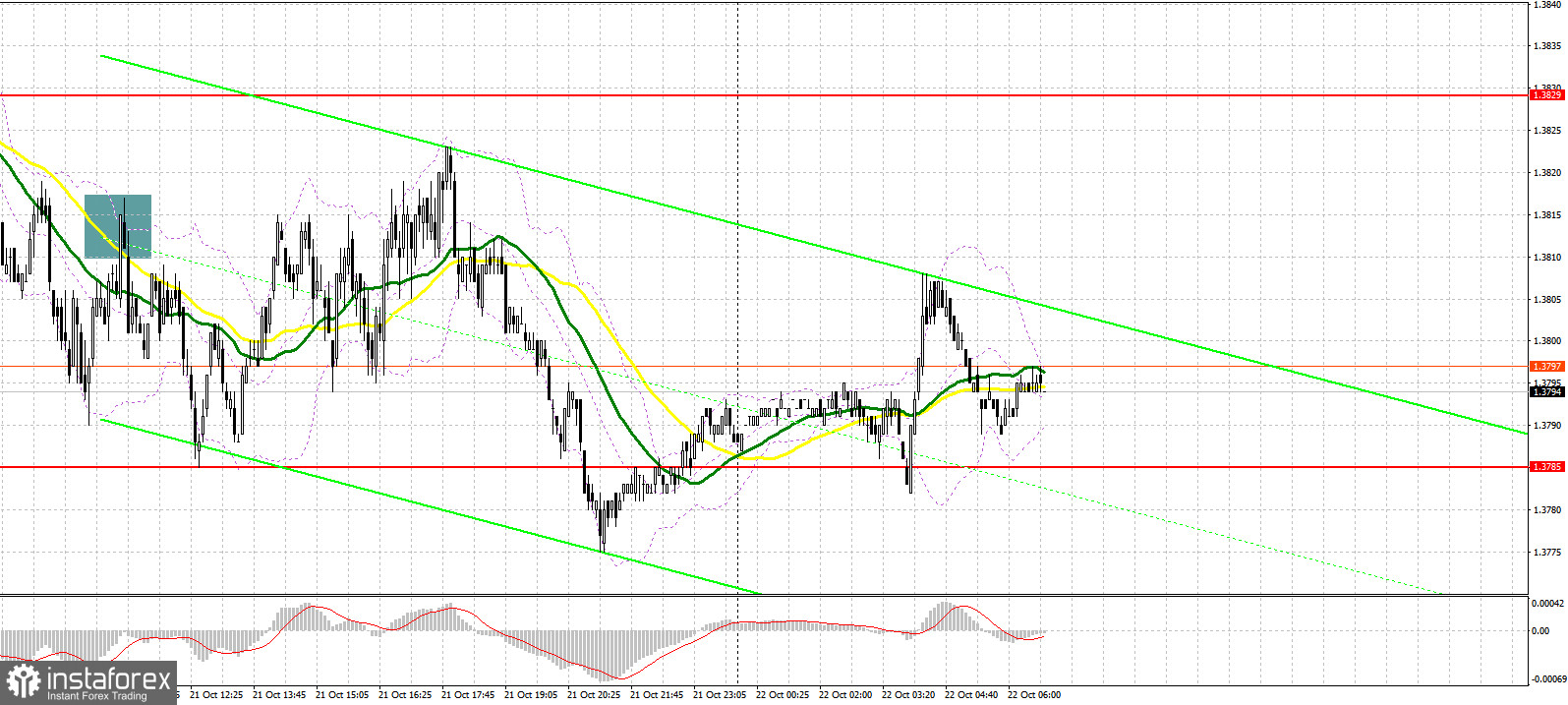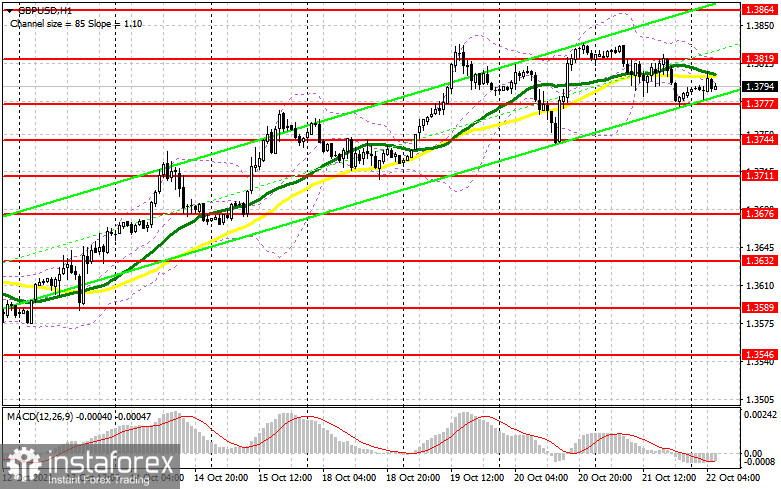To open long positions on GBP/USD, you need:
Yesterday, the pressure on the British pound returned in the second half of the day after good fundamental statistics on the US economy. Several signals for entering the market were formed only during the European session, which I would like to analyze. Let's take a look at the 5 minute chart and talk about what happened. I highlighted the level of 1.3811 and advised you to buy the pound there when a false breakout was formed. Everything happened according to the scenario: we saw a decline below 1.3811 and then a return to it, which resulted in forming a signal to open long positions further along the trend. But, to my regret, a large upward movement did not take place and after a while the pound failed 1.3811 again, which led to a consolidation of losses. Closer to the middle of the day, it was possible to observe the test from the bottom up of this level, which provided an excellent entry point into short positions. The pair went down 25 points and then the bears' initiative dried up. No signals to enter the market were formed in the second half of the day due to low volatility.

Today there are serious reports on activity in the manufacturing and services sector in the UK, which may put pressure on the British pound in the morning, so I do not expect anything good from this data. The primary task of the bulls for today will be to protect the important support at 1.3777, on which, in my opinion, the further short-term direction of the pound depends. Since the trend is still upward, a rather large number of bulls' stop orders can be concentrated below this range, and only a false breakout at this level creates a good entry point into long positions with the goal of returning to weekly highs. Consolidating above 1.3819 with a reverse test from top to bottom will give a new entry point to long positions and allow you to get to new local levels: 1.3864 and 1.3910, where I recommend taking profits. The next target is still the area of 1.3955. If the bulls are not active in the area of 1.3777, the best option for buying the pound would be the test of the next support at 1.3744, which acts as a kind of lower border of a wider horizontal channel. However, I advise you to open long positions there only after a false breakout. You can watch buying GBP/USD immediately for a rebound only from a low like 1.3711, or even lower - from support at 1.3676, counting on a correction of 25-30 points within the day.
To open short positions on GBP/USD, you need:
The bears have a real chance to break the upward trend, but for this they need to try to break below the support 1.3777. Much will depend on important macroeconomic indicators for UK activity. If the data turns out to be worse than economists' forecasts, it is possible that the bears will prefer to take profits after a large upward trend observed since the beginning of this month. A breakthrough of 1.3777 and a reverse test from the bottom up will form a signal to open short positions in hopes that the pair would fall to 1.3744. The next target will be the area of 1.3711, which will finally finish off the bulls. I recommend taking profit there. In case the pair recovers after the data on activity in the UK, only the formation of a false breakout in the resistance area of 1.3819 will be a signal to open short positions in GBP/USD. I advise you to sell the pound immediately on a rebound from a larger resistance at 1.3864, or even higher - from a high of 1.3910, counting on the pair's rebound down by 20-25 points within the day.

I recommend for review:
The Commitment of Traders (COT) report for October 12 revealed a reduction in both short and long positions, but there were more of the former, which led to a slight recovery in the negative net position. Despite rather active attempts by the bears at the beginning of that week to resist the bullish trend, bulls turned out to be stronger, which led to further growth of the pound against the US dollar. Reducing a number of problems with disruptions in supply chains that shook the pound earlier this month, are now gradually returning to the market players who are betting on further strengthening of risky assets. Constant speeches and statements by representatives of the Bank of England that it is necessary to take inflationary pressures more seriously, also add confidence to the pound bulls. The minutes of the central bank meeting last week confirmed the BoE's intentions to take seriously the option of raising interest rates during the November meeting - a bullish signal for GBP/USD. Therefore, the only problem that stands in the way of the pound bulls is the US Federal Reserve. Although they are not going to raise interest rates, they are also heading for tightening monetary policy. However, the British pound in these conditions looks much more preferable. The COT report indicated that long non-commercial positions declined from 48,137 to 46,794, while short non-commercials dropped from 68,155 to 58,773, which partially reduced the advantage of sellers over buyers. As a result, the non-commercial net position amounted to 11,979 against -20,018. The closing price of GBP/USD remained almost unchanged for the week: 1.3591 against 1.3606.
Indicator signals:
Moving averages
Trading is carried out below 30 and 50 moving averages, which indicates the formation of a downward correction in the pair.
Note: The period and prices of moving averages are considered by the author on the H1 hourly chart and differs from the general definition of the classic daily moving averages on the daily D1 chart.
Bollinger Bands
In case of growth, the upper border of the indicator at 1.3819 will act as a resistance. As a support, we can count on the lower border of the indicator in the area of 1.3790.
Description of indicators
- Moving average (moving average, determines the current trend by smoothing out volatility and noise). Period 50. It is marked in yellow on the chart.
- Moving average (moving average, determines the current trend by smoothing out volatility and noise). Period 30. It is marked in green on the chart.
- MACD indicator (Moving Average Convergence/Divergence — convergence/divergence of moving averages) Quick EMA period 12. Slow EMA period to 26. SMA period 9
- Bollinger Bands (Bollinger Bands). Period 20
- Non-commercial speculative traders, such as individual traders, hedge funds, and large institutions that use the futures market for speculative purposes and meet certain requirements.
- Long non-commercial positions represent the total long open position of non-commercial traders.
- Short non-commercial positions represent the total short open position of non-commercial traders.
- Total non-commercial net position is the difference between short and long positions of non-commercial traders.
 English
English 
 Русский
Русский Bahasa Indonesia
Bahasa Indonesia Bahasa Malay
Bahasa Malay ไทย
ไทย Español
Español Deutsch
Deutsch Български
Български Français
Français Tiếng Việt
Tiếng Việt 中文
中文 বাংলা
বাংলা हिन्दी
हिन्दी Čeština
Čeština Українська
Українська Română
Română

